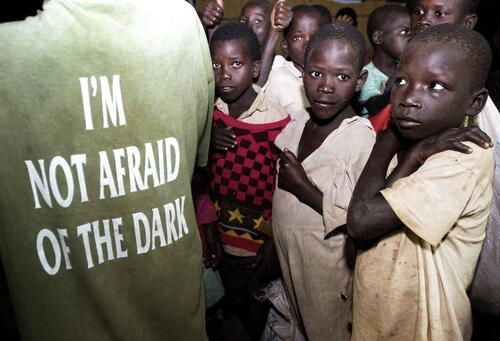They arrive in Gulu in droves every night. Up to 12,000 children, mostly 10 year olds but some as young as two, walk several miles from villages and IDP camps surrounding this northern Ugandan town, hoping to find shelter for the night. The next morning, they set out again, en masse, to attend school near their homes, only to return again later that night.
"It's shocking to see this massive flow of little kids carrying blankets, sleeping bags, even mattresses," says Bastien Vigneau, Deputy Director of Operations for MSF in Switzerland who is also in charge of MSF's projects in Gulu. "It's dramatic in terms of human dignity."
They are called the 'night commuters', a euphemism that hides an ugly, cruel reality. Throughout northern Uganda an estimated 50,000 children take part in this exodus every night, looking for shelter in town centers out of the sheer terror of being attacked or kidnapped by soldiers from the Lord's Resistance Army (LRA). The fear has often been justified, especially as the 18-year conflict in Uganda's north has intensified in the last two years.

Gulu is home to 30,000 people. During the day, the well-stocked markets bustle with economic activity. The town boasts three hospitals, and a private clinic that draws people from Kampala for things like liposuction and artificial insemination. There is little sign of this mass of children. By nightfall, though, the children return, and by the 9 o'clock curfew the streets are deserted. Occasional artillery fire reminds people that war continues in the countryside.
The gates of Lacor hospital, on the northwest fringes of town, close at 9 pm on a sea of nearly 5,000 children who shelter in the hospital's central square. There is very little supervision and, when it rains, the strongest kids jostle for position underneath the roof of a veranda that can cover perhaps a thousand.
Sleeping in the open poses many health risks. Every night an MSF team treats up to 600 kids for scabies - a severe skin disorder caused by burrowing mites and exacerbated by the crowded conditions. A December 2003 survey by the International Organization for Migration (IOM) found that 35% of the children have been victims of harassment, while many feel sexually threatened. Half the children only eat one meal a day.
"You can see the distress in the kids eyes," said Vigneau. "They are really tired but can't sleep."
And with the rainy season set to start in a few weeks, such distress may only increase.


